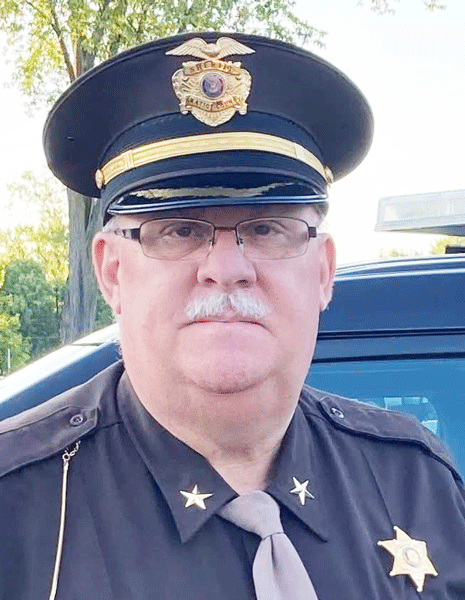Rosemary Horvath
Herald Correspondent
After nearly four decades in law enforcement, Gratiot County Sheriff Mike Morris is preparing to hang up his badge at the end of the month.
“I wouldn’t have traded it for anything,” Morris told The Herald, reflecting on a career he described as both demanding and fulfilling. The years, he admitted, seemed to have flown by.
“You have to stay focused and stay vigilant,” Morris said. “It’s a tough profession, especially with the stigma placed on police officers today.”
Gratiot Commissioners, on behalf of local government, recently saluted Morris in a resolution listing accolades and gratitude for exemplary service and dedication to the safety and well-being of the county.
The declaration pointed out Morris’s leadership that “fostered a strong sense of security, trust, and cooperation between law enforcement and citizens.” His implementation of “innovative programs and initiatives on crime prevention” also gleaned praise.
Tom Clark, the county’s longtime animal control director is set to take over. He out-distanced two other challengers vying for the position in the Republican primary, and one other in the general election.
Since November, Clark and Morris have met several times “to make the transition smooth,”
“My advice to him is to take care of your employees and they will take care of you,” Morris said. “Listen to the public. You may not be able to do everything they want but at least you have listened to their concerns.”
Changing times
There isn’t a single profession that hasn’t undergone a transformation related to procedures, outcomes, and requirements.
Policing, for instance, now comes with car and body cameras, radar systems, and all-wheel drive vehicles compared to just rear wheel when Morris first entered the profession.
On the down side, Morris acknowledged a mental health system nearing a crisis, both statewide and nationally.
“If something is not done in the next 10 years to get it fixed, we will see things far worse than we have now,” he warned.
For young officers starting out, Morris suggests being “strong-willed, able to multi-task, and able to process situations quickly because you are making split-decisions.”
Morris grew up in Bethany Township with two sisters after the family moved from Greenville in Montcalm County, to St. Louis, then Bethany. His aunt was a corrections officer at the sheriff’s department in 1986 who also dispatched officers pre-911.
“Back then, St. Louis, Alma, and Sheriff had their own dispatch centers. Today, Central Dispatch dispatches for all the departments,” Morris said.
His aunt suggested he apply for a reserve officer opening in St. Louis.
He knew nothing about police work and hadn’t considered learning but gave it a try as a reserve officer.
Reserve officers back then rode along with certified officers to basically observe, he explained.
This group had no arrest authority except they could assist in a taxing situation. Or, as Morris put it, “they are seen and not heard from. If a struggle ensued a reserve officer can help an officer subdue a suspect.”
At one time in the field of policing, reserve officers at local departments were commonplace. This changed as liability issues arose, thus implementing a stricter set of training procedures.
More common today is to have patrol cars manned by a single officer that requires a certified officer to radio for backup.
When confronted by an armed individual, Morris said an officer’s call for backup simultaneously is broadcast across the system and heard by all local departments.
In other words, Morris says, “It’s all hands on deck.” He referenced the county’s mutual aid agreement involving sheriff, city and village police departments.
The St. Louis Police Department was his sponsor for the Northeast Police Academy at Delta College. The program lasted 12 weeks compared to today’s term of 17 weeks with so much more to learn.
Not surprising, Morris noted, the curriculum gets longer as the world changes. New technology, weapons, lasers, even learning patrol car devices are topical.
“You barely had radar,” when he started out. “Now, there’s front and rear radar, body cameras, and cameras on cars. Cell phones on police cars film everything just like the public does. I once carried a revolver. Now it’s a semi-automatic handgun.”
Crime investigations have changed immensely. “Security cameras are everywhere,” to aid investigations. “Thirty-five years ago, there never was any footage,” Morris noted.
Officers also undergo specialized training associated with suspected driving under the influence of narcotics and marijuana.
After graduation, St. Louis hired him as an officer. By 1987, he was named sargeant of the road patrol. Three years later, Sheriff Rick Beracy hired Morris as a road patrol deputy. He took on detective work in 2001 then replaced Earl Hunt who retired as undersheriff in 2019. Before the year end, Sheriff Doug Wright retired and Morris assumed the top post.
As for his life in retirement, he doesn’t specify any specific plans except to say he and his wife of 36 years will visit their two adult children and families living out of state.
“And I will play a lot more golf,” he joked.

